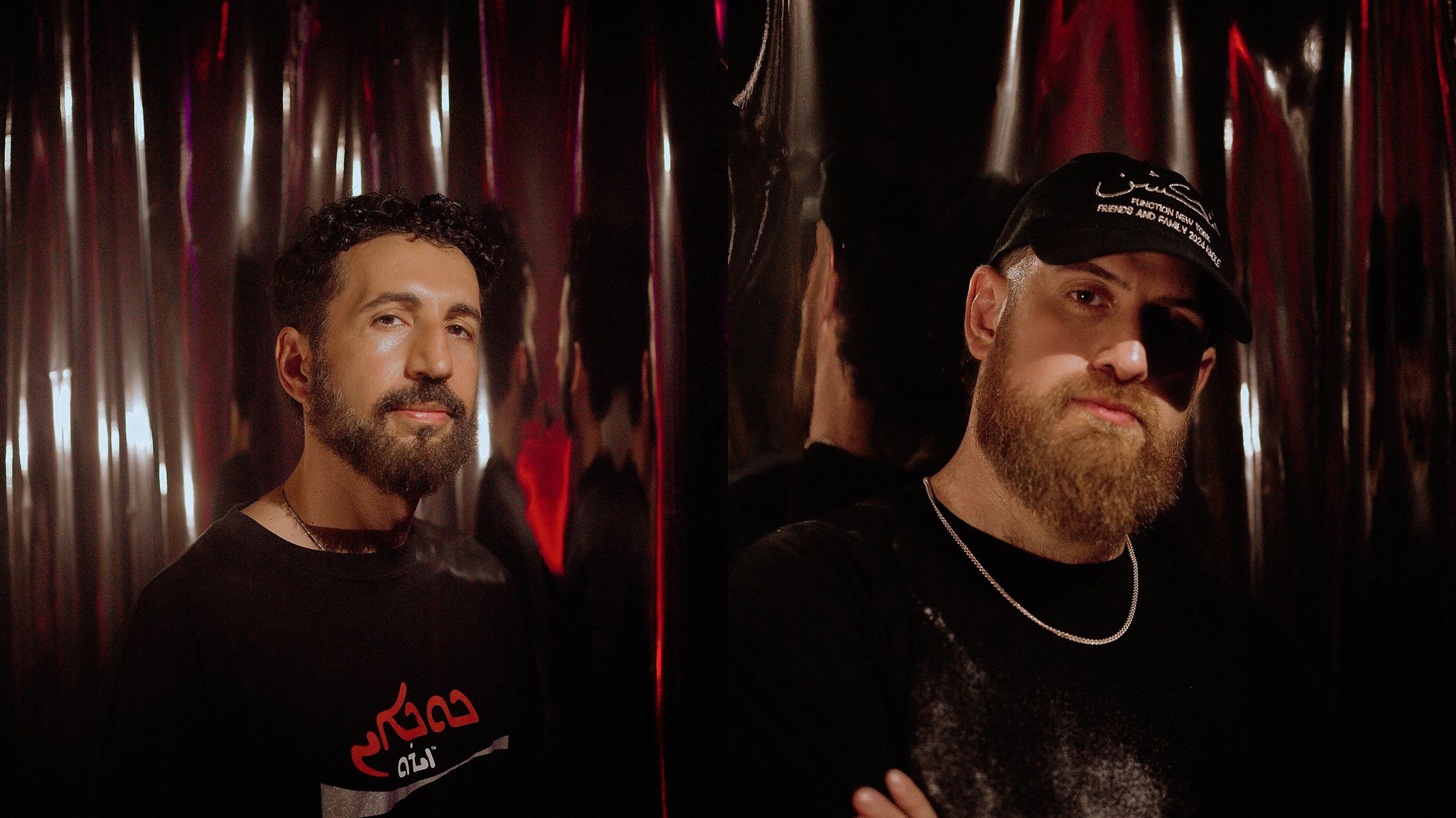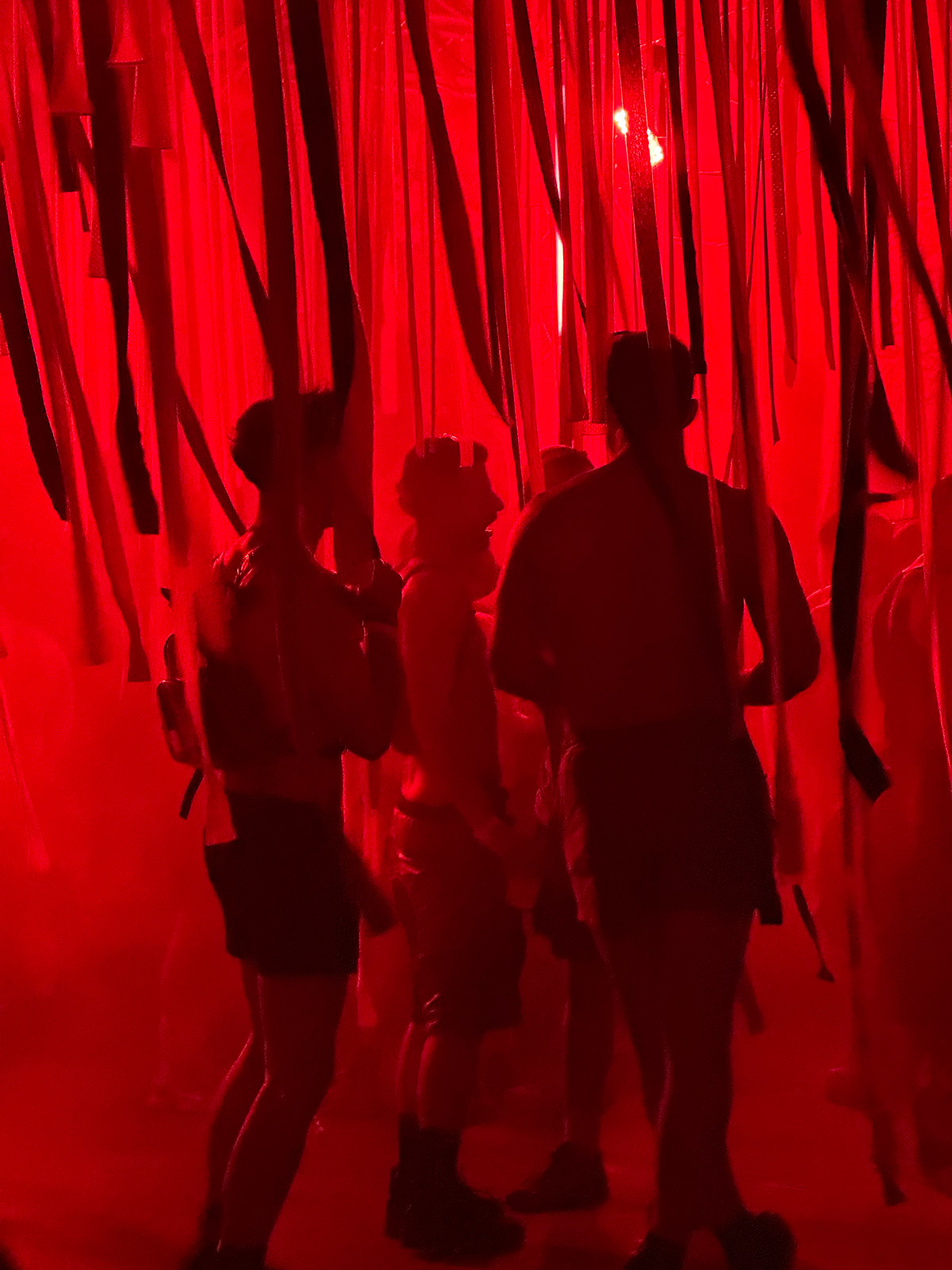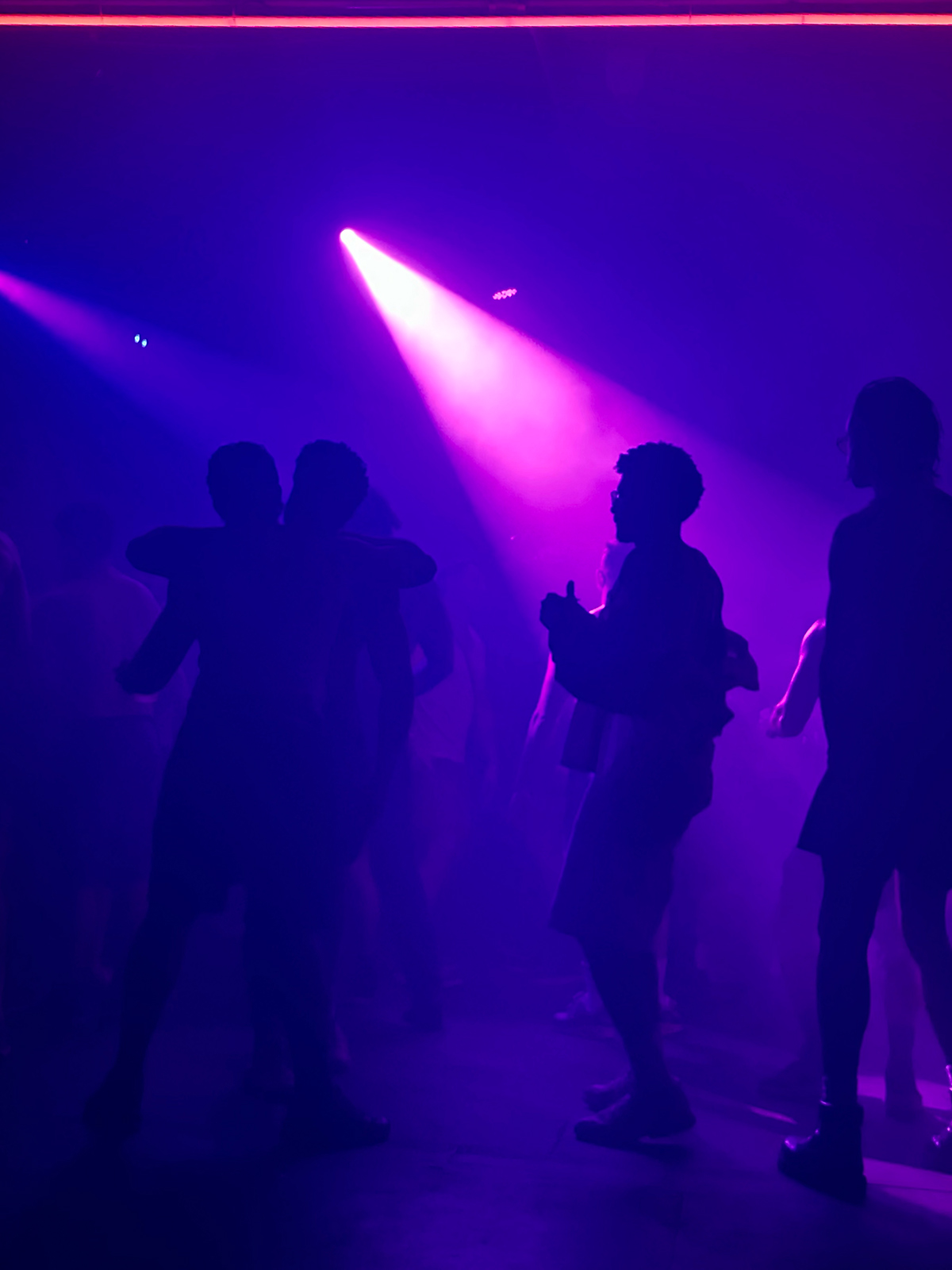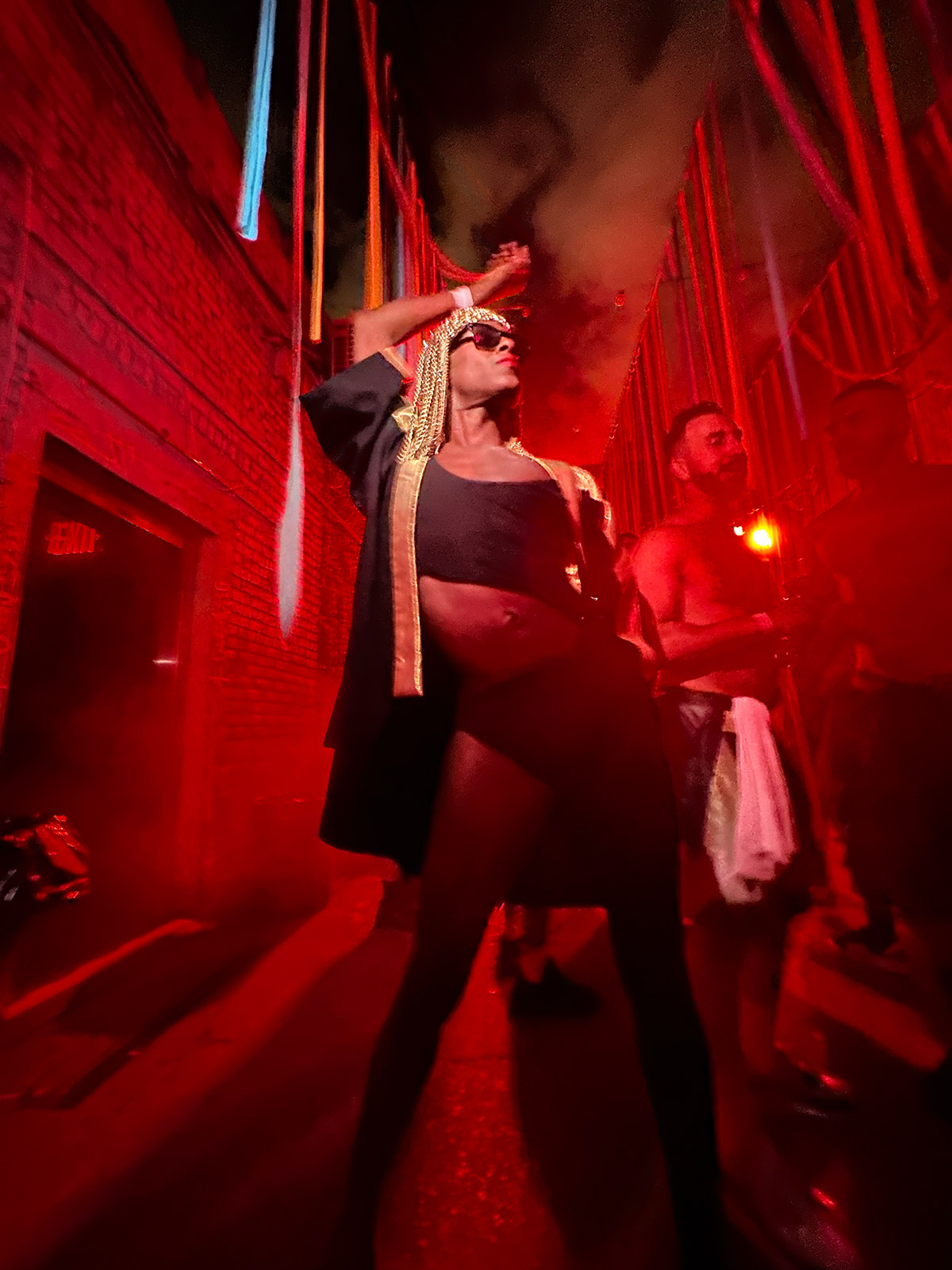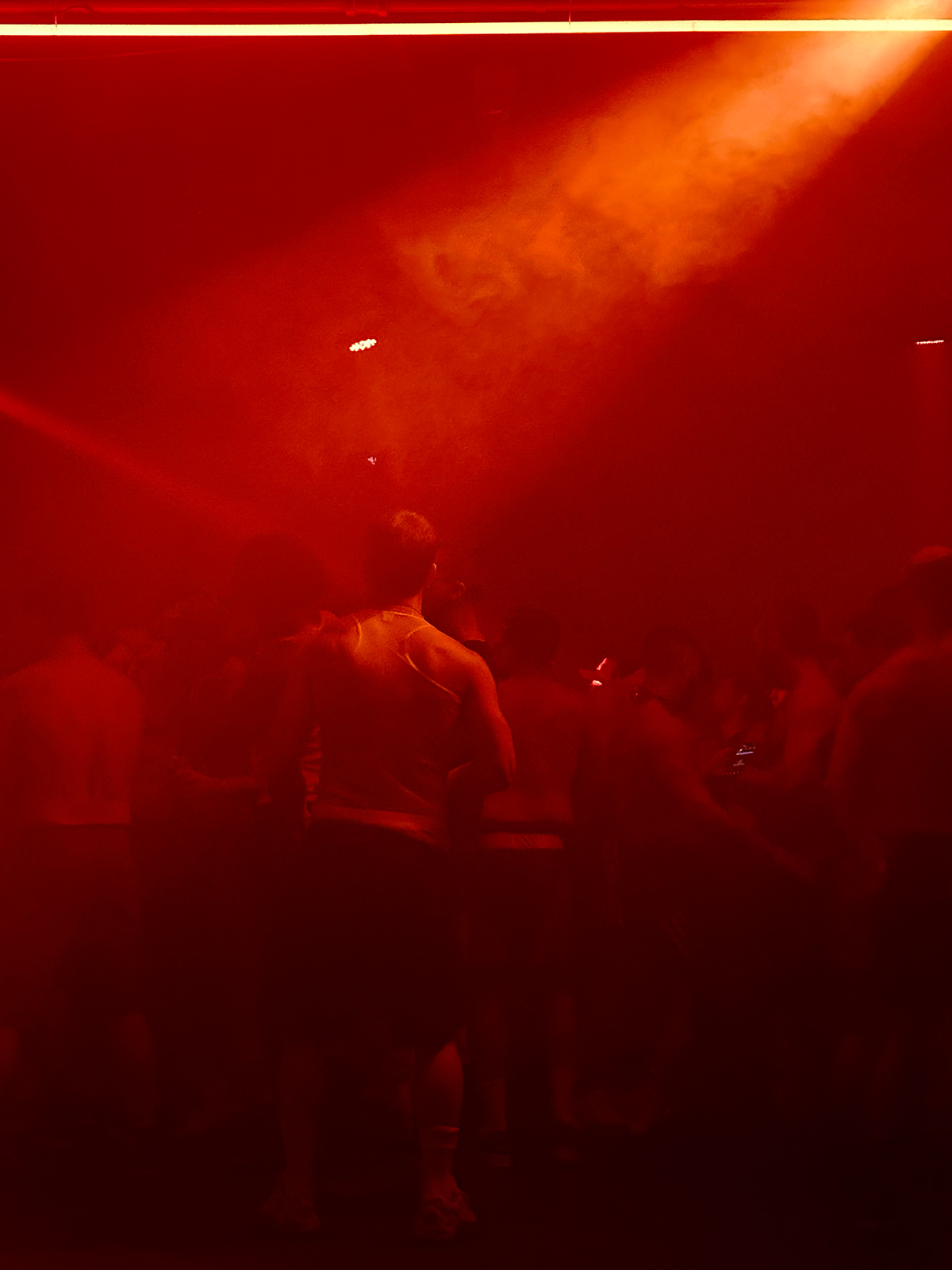Document gets to the heart of club culture with DJ Andrew Makadsi and “super host” George Najm, the couple and creative duo responsible for the underground party series
Function is the queer party New York was missing—so say its organizers, resident DJ Andrew Makadsi and superhost George Najm. On its dance floor, gays, theys, and dolls twist their hips to the sharp pops of a derbekeh, a Middle Eastern percussive instrument, overlaying thrumming techno and pulsing house tracks alike. At Function’s outdoor space, groups of friends lay out in a sumptuous lounge setup, whispering hot gossip as they pass the nozzles of gurgling hookahs between them. People from every corner of the city’s queer nightlife scene converge at Function’s changing venues.
Makadsi and Najm are the partners (and lovers) behind Function’s open embrace. The recurring event is the duo’s answer to the niche-ification and segregation of the city’s gay nightlife scene, as they perceive it. Makadsi also serves as creative director to both the party and global superstar Beyoncé. His genre-bending sound runs the gamut from techno to house, colored by a distinct influence from his Lebanese upbringing. Najm is the party’s producer and booker, whose Arab background kindles the warmth behind his meticulous curation of venue and vibe.
The couple cut their teeth hosting house parties on the rooftop of their Williamsburg apartment. Function builds off the intimacy of those early experiences, now with a welcome extended to hundreds more people. Having first met on a dancefloor themselves, Makadsi and Najm believe in a party’s power for good. As soon as New York’s pandemic lockdown loosened, they launched Function, catering to their diverse group of friends and other yearning locals who needed somewhere to reconnect and release. The party is still young and experimental, having marked its three-year anniversary this past Pride, with a growing base of loyal regulars.
As a deliberate reflection of Makadsi and Najm’s ideals, Function is as much a recreation of their past in the glory days of New York’s legendary ’90s club scene as it is a vision of their utopic club future; one with consistently good music for everyone.
Document sat down with the pair for a close look at Function’s inner workings and found talent, culture, and heart.
Adnan Qiblawi: Function is as ‘New York’ as it gets. Is it going international any time soon?
George Najm: We actually did last year. We went to Toronto, London…We were going to do Paris, but the date didn’t work out.
Adnan: How did throwing those parties feel?
George: It was surreal. I had dreamt about it years prior. When Andrew and I first started dating, I was working a corporate job in building and design. It was hard to see Andrew because we were long distance and I didn’t get much time off, so I set intentions to redesign my life. I wanted more freedom by going back into business for myself, which I had done most of my life. I said to myself, ‘When Andrew goes on tour with Beyoncé,’—because I knew he was working on an album that would eventually tour—‘I want to be able to go with them.’ We started Function like a year later in June of 2021 during Pride weekend, basically the moment partying indoors was allowed again after the pandemic. So I knew that I wanted to go on tour with Andrew and I said, ‘Wouldn’t it be amazing if I could throw some afterparties for the concert?’ And then that’s exactly what ended up happening.
Adnan: Is that how Function was envisioned originally? As afterparties to Beyoncé’s concerts?
Andrew Makadsi: Before the pandemic, we used to throw house parties on the roof of our Williamsburg apartment building on Saturdays. So we used to just go up there, have some friends over, and I would DJ. A couple of my friends would too, like Davie and Antwyone of Kia. Who else used to DJ?
George: Tommy Hart jumped in one day. Dangerous Rose, too.
Andrew: It’s funny because, when I was growing up in Lebanon, we always had the hafleh a’al sateh (rooftop get-together). You know that vibe. That’s just what we do. So we just carry it in our genes. Function is really a manifestation of that. After everything went into lockdown I really honed in on the craft of DJing. I was working on Beyoncé’s album Renaissance at that time, so it was good for me, as a creative director, to immerse myself in the music and the process of this culture. And that’s when I fell in love with every aspect of it.
Adnan: Every aspect of DJing?
Andrew: Yeah, and of music. How to design spaces and how to play music in those spaces, and how to architect the vibe. Especially with dance music. I feel like once we started playing around with the music for long enough, Kia and I, we found our personal New York sound.
We were all excited because we were not just house, we were not just techno. We felt there was a new expression that was ready to debut.
George: Andrew and I had different tastes in music coming into our relationship. I went to house music parties, and he went to the techno underground parties so we started going to each other’s parties. I took him to the ones I liked, and he took me to his.
Adnan: Which ones?
George: Well, I think the first party I took him to was Honey Dijon on New Year’s Eve at Avant Gardner. I was like, ‘This is my favorite DJ. Let’s go see her.’ And then he took me to UNTER.
Andrew: Yeah, UNTER, Spectrum. It’s funny because when you would come to the raves with me back in the day, the way you would dance was so house. You’d like, face me and dance then I would turn you around—no, face the DJ.
George: [Laughs] Yeah I was a little confused at first, but I got the hang of it! It’s a different way to party, a different way to dance.
Andrew: But I feel like a lot of people who were techno first would be allergic to house. I think they all eventually soften, because house is so broad. Once they find the good stuff, once the light bulb goes off, they’re like, ‘Oh, okay, I love that house. Actually, I like house more than techno.’ And then they’ll have this back and forth.
Adnan: Yeah, the two churches of partying.
George: There are three churches. The third is ‘I don’t care what music is playing, I’m just here to hook up.’
I’m a club kid from the ’90s. I started going out in ’98. I was 18 years old and my sister was living in the city. I came up for my birthday and she took me to Tunnel that night for after hours. I had no idea what I was walking into, and I just fell in love. I became obsessed with the scene. I went to school in Pennsylvania 90 minutes away and I would drive in every weekend I could. I started to just go out so regularly to places like Sound Factory, Limelight, Exit, Twilo. It was like such a different scene back then, where everyone just went out for the music, and everybody committed to wherever they were going. That’s it. There’s no one texting you that there’s these other six parties going on tonight.
Adnan: Because there weren’t as many options?
George: There were options, but no one had cell phones. Everything was done through paper flyers or word of mouth. So people followed a club religiously, because they followed its resident DJ. So it was Jonathan Peters or Junior Vaquez playing all night. You didn’t encounter homophobia in these spaces. Even though it was predominantly hetero, everyone was just having the best time, fully engaged. Parties back then used to start Saturday night and they would end Monday morning, like in Berlin. But that all got shut down by Giuliani in the early 2000’s.
It took about a decade for the scene to start to recover. By the time it did, we have all the social media apps, and we’re swiping, narrowing our focus onto this exact one type of person, and now the parties are [more] segregated. So you get parties like Horsemeat Disco, Papi Juice, Club Carry. With a city this big, you can get away with hyper-niche parties, but it doesn’t necessarily make the parties good parties. So when I decided to start Function around April of 2021, I was walking down the street with a friend that has also been going out since the ’90s. I said to him, ‘When I start Function, I want to throw a party that people will be talking about 20 years from now, the way we still talk about the clubs from 20 years ago.’ A part of that is about creating a space that is music-first, and a space that is inclusive in an organic way.
“Gays who have have been with us since the beginning recently told me that they haven’t heard music like ours at a gay party before Function. They were saying that they didn’t really feel like there was house or techno that was for gay people, besides Carry Nation.”
Andrew: I think a lot of New Yorkers felt the same way. That’s why after the pandemic, I feel like there was a renaissance of New York nightlife. The world had changed. A lot of people’s values, identities, and desires shifted. Music is such a democratic medium and it’s an emotion that is easy to access for all people.
Adnan: When we first came out of the pandemic, everyone was still feeling a little edgy and weird. How would you say Function has changed since then?
George: I feel like we’ve cultivated a really beautiful, diverse, loyal dance floor. And every time we throw a party, there’s still new people discovering it. But we also have the people who’ve been there ever since the beginning and they’ve gone through all our venue changes. It’s changed musically too. I started it first and foremost because I wanted to give Andrew a platform, because he’s so talented, and I’ve been following DJs my whole life. When I heard him start to play, I was like, Holy shit. We need to hear this on the dance floor. So we launched Function with Andrew’s sound.
Gays who have have been with us since the beginning recently told me that they haven’t heard music like ours at a gay party before Function. They were saying that they didn’t really feel like there was house or techno that was for gay people, besides Carry Nation.
Adnan: I remembered thinking, in the early days of Function, Wow, everyone is here. People from all walks of the queer nightlife scene were on that dance floor.
George: There was a lot of speculation in the beginning, which was just kind of funny to us about who we were going to be for. People were wondering, ‘Are they going to be for the gays? Are they going to be for the dolls?’ We would just laugh because it’s for everyone. It was so confusing to people that we weren’t a space that was just for one part of our community. Function was built up as an extension of our diverse friend circles.
Adnan: Sometimes we go to parties with incredibly high production value and we feel we’re supposed to be having more fun than we actually are, and something is wrong with us if we aren’t—like the fun is prescribed. Function on Pride weekend Sunday felt like the opposite of that, it felt permissive.
George: That’s what we want. We want people to feel free to just be themselves.
Andrew: It always goes back to my roots of partying in Lebanon. The way we party there is so different. Sometimes we go out and there’s a one man show, and this guy on the keys, or hookah spots, or a cafe with music. So to me, I always wanted to provide that range at our party. That’s why I’ve been manifesting this soft outdoor space with a hookah lounge, because we like to kiki. It’s why we gravitate to green rooms. It’s all by design.
Adnan: I guess that profoundly resonated with the Lebanese in me. I spent most of my time at Function outside, lounging around a’am tu’ hanak (flap-jawed) and it was one of the highlights of my pride weekend. The girls were taking their turns sitting down, gossiping, telling me their stories.
Andrew: We’re very intentional. [Looks to George] You’re such a super host, even if you’re having people over, when you do whatever you’re doing, you’re paying attention to everything.
Adnan: It’s called Arab hospitality for a reason.
George: [Laughs] At the Pride Function my friend Joe said to me, ‘I feel like I’m in an extension of your living room right now. I feel you in every corner.’
Adnan: That’s so sweet. I must have connected with that instinctively. What’s next for Function?
George: Well the next one’s on September 28th, and the lineup is very much a New York affair with the heavyweights. Carry Nation is booked for the first time. We’ve had Nita Aviance a couple of times before but never with Will Automagic so it’ll be fun having them both. Mike Servito will be playing.
Andrew: Musically I’m still hoping to continue developing my sound as an Arab queer. Function has given me the space to pour my Middle Eastern upbringing into New York and make a sound that reflects my mixed identity. We’ve been here for a minute, and it’s been such a privilege to be able to do this in this city, because no shade, but this is the city.
Adnan: Shade to every other city, it’s New York or bust, baby.
Andrew: I have newborn nephews, and once they’re old enough to visit the city I can be like ‘By the way guys… back in my day…’
George: ’90s club kid George would be so gagged if he knew he would be throwing Function one day.


